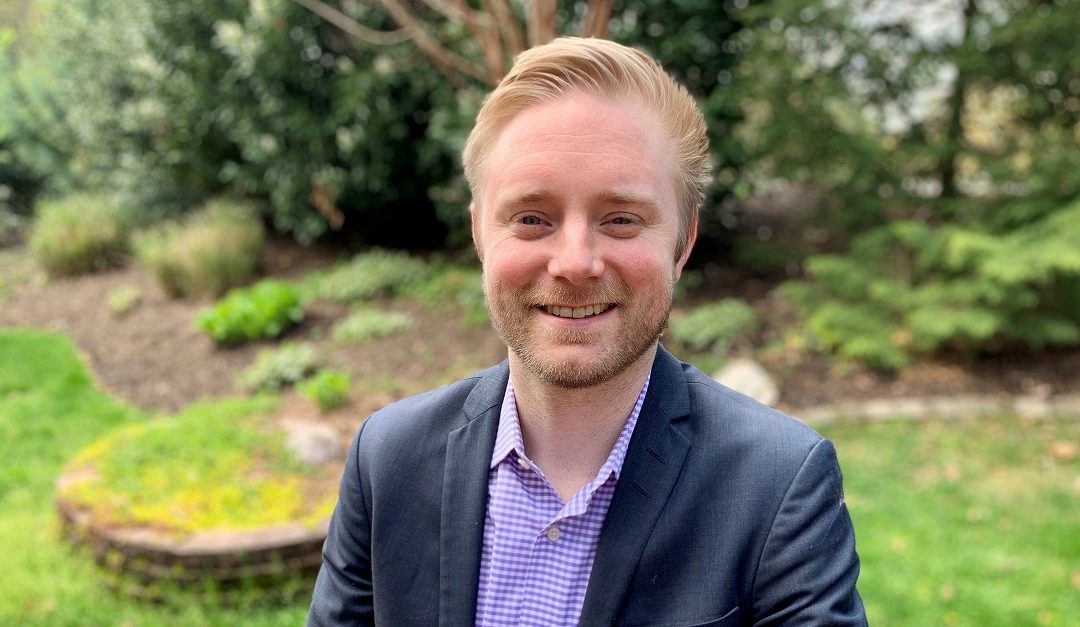By Stacey McLachlan. Originally published in the summer 2020 issue of Business Class magazine.
You could call Daniel McCombe, BCom ’10, MGB ’11, a disruptor. It’s the preferred nomenclature in tech circles for one who’s shaking things up in their industry, and he’s certainly done plenty of that. But the Gustavson grad prefers a different term: transformation leader.
His current title is Head of Finance—Strategy and Transformation for Airbus Americas, and “transformation” is a word he takes to heart. “Disruption usually brings benefits with significant costs,” says McCombe. “Transformation, on the other hand, is about anticipation or seeing around corners. Effective transformation is planned change.”
McCombe believes that positive, productive transformation is about making step-change improvements without destabilizing those essential components that still need to run smoothly for the health of the business. It’s not that there aren’t costs or negative outcomes—you can’t make an omelette without breaking a few eggs, as they say—but a transformational mindset is about anticipating what those outcomes will be before they happen, and mitigating their impact.
After graduating with his Master of Global Business, McCombe parlayed entry-level analyst jobs into a role as Asia and Pacific Controller for Airbus in India. Eight years later, he stepped up as Airbus’ Financial Transformer before the company realized this role could make an even bigger impact at a leadership level, and created the position he currently holds.
He’s not the only “transformation officer” in the world, to be sure—but McCombe sees his work as being a more positive interpretation of a title that often accompanies layoffs and rightsizing. “You’ll see it as an elevated executive title—Chief Transformation Officer—but often it’s a glossy word to put on someone who’s tasked to help right the ship during turbulent times for a company that is struggling to keep up with its competitors and stay relevant in the market.”
As a company lays off 2,000 people, you’ll probably also see a “Transformation Officer,” he says. But at Airbus, McCombe isn’t cleaning house: he’s optimizing. His peers are the heads of treasury, accounting, tax and planning and reporting—the operational dream team. “My job is actually to help them perform better,” McCombe says. “Their focus is on keeping the ship sailing, while I’m saying, ‘instead of a sailboat, we may need a speedboat.’”
Having the responsibility of transforming a company may sound daunting, but the entrepreneurial slant of the job fits McCombe to a tee (he specialized in entrepreneurship during his BCom). “Like any innovation-focused role, transformational leaders need to accept that it’s okay to fail,” says McCombe. “My job doesn’t mean I’m always innovative and thoughtful…just that I’m stubborn,” he laughs. “I don’t want to break things for the sake of it, but I do want to leave a mark.”
In practice, this means approaching the challenge from both a macro and micro perspective. McCombe is benchmarking, looking at other companies in the field who are excelling and evaluating where Airbus stands, whether it needs to keep up and why. On the micro level, he’s looking to the future and helping individuals to be ready for whatever comes next—like adapting accountants’ roles from crunching numbers to managing technologies such as artificial intelligence, robotics and machine learning.
“We are training people to master the tools that are disrupting their jobs so that instead of being displaced by the massive wave of automation that is coming, they can leverage that threat and turn it into an opportunity to make themselves more indispensable to the organization,” says McCombe.
Most employees will spend 80 per cent of their time on recurring activities, and 20 per cent trying to rethink and improve the way they currently do things. For McCombe, that ratio is reversed.
“I find myself trying to ask the strategic questions,” he says. “Most of my time is spent thinking about how to do things in dramatically different ways.” That being said, McCombe is quick to point out that radical change needs to happen with respect to the legacy that came before it.
“It’s critical to appreciate the work that’s being done currently, and not pooh-poohing the way things are currently done, because most of the things we do are the way they are because of valid reasons,” he says. “To help the team change the way they work starts with how the current way of working has value. You shouldn’t do things differently just to say you did.”


